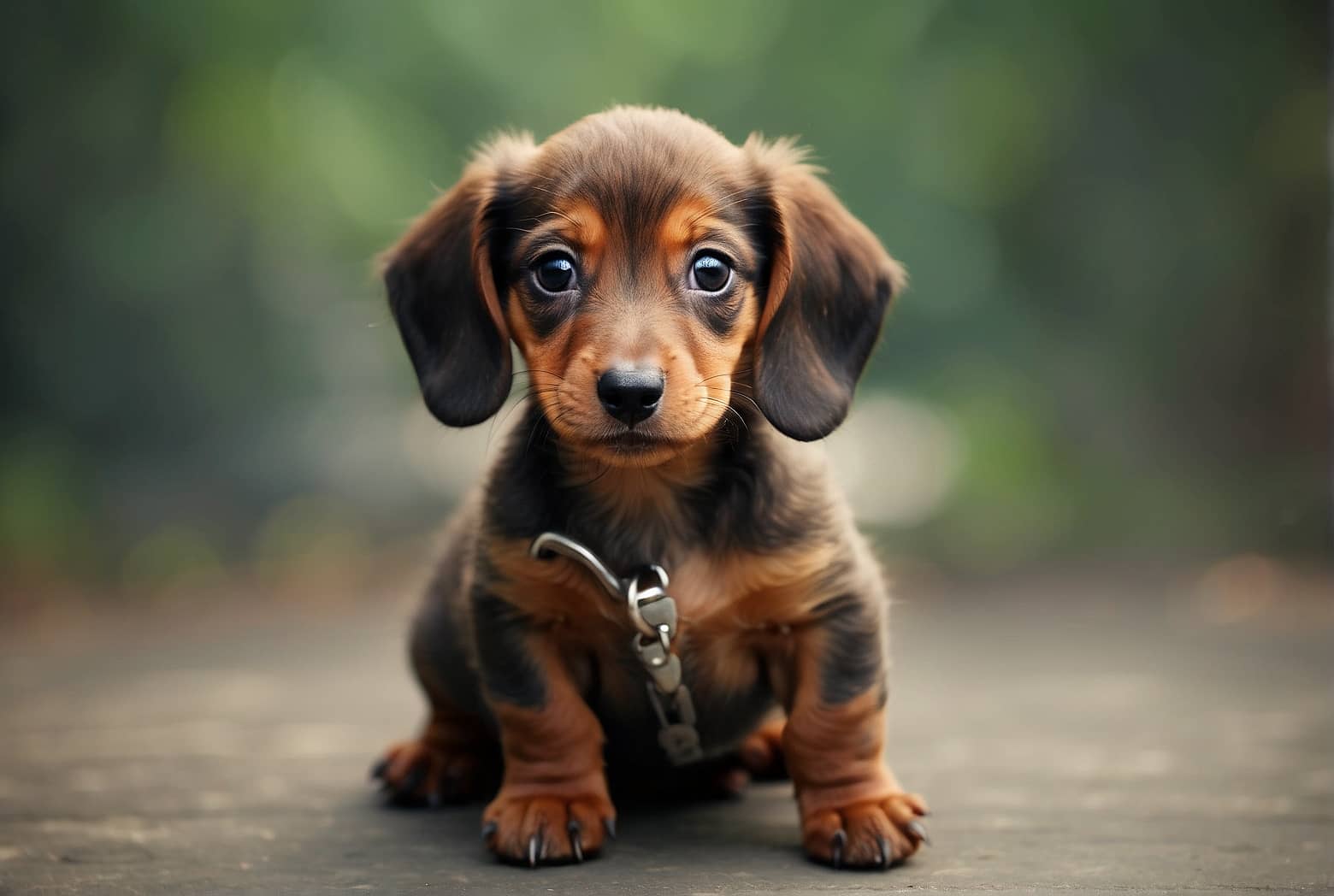Last Updated on April 23, 2024 by admin
If you’ve recently welcomed an adorable Dachshund puppy into your home, you may be wondering when their endless energy and mischievous antics will calm down. From their tiny paws that scamper around to their insatiable curiosity, Dachshund puppies can be quite the handful. But fear not, for there are effective ways to help your furry friend find their inner zen. In this article, we will explore some tried and tested methods to calm down Dachshund puppies, allowing both you and your little bundle of joy to enjoy moments of tranquility together. So, let’s embark on this calming journey and discover the secrets to fostering a more peaceful and contented pup.
Understanding Dachshund Puppies
Dachshund puppies are known for their lively and energetic nature. They possess distinct characteristics that make them unique and lovable pets. Understanding these characteristics is essential for effectively managing their energy levels and promoting their overall well-being.
Dachshund Puppy Characteristics
Dachshund puppies are small to medium-sized dogs with long bodies and short legs. They have a fearless and curious nature, often displaying a high level of confidence. Dachshunds are known for their keen sense of smell, which makes them great hunting companions. However, this characteristic also means they can easily become distracted by scents, leading to overexcitement. They are generally loyal, loving, and active. It’s important to keep these traits in mind while providing care and training for your dachshund puppy.
Developmental Stages
Similar to other dog breeds, dachshund puppies go through various developmental stages from birth to adulthood. Understanding these stages can help you better manage their behavior and expectations. The stages typically include the neonatal stage (from birth to two weeks), the transitional stage (from two to four weeks), the socialization stage (from four to twelve weeks), and the juvenile stage (from three to six months). Each stage comes with its own needs and challenges, so it’s crucial to adapt your approach accordingly.

Energy Levels
Dachshund puppies have high energy levels and require regular exercise to keep them happy and healthy. Failing to meet their exercise needs can lead to restlessness, destructive behavior, and even health issues. While their energy may be a lot to handle at times, there are various strategies you can implement to keep them calm and content.
Creating a Calm Environment
Creating a calm environment is crucial for the well-being and happiness of dachshund puppies. By providing a safe space, limiting exposure to overstimulation, and maintaining a consistent routine, you can create an environment that promotes relaxation.
Provide a Safe Space
Designate a specific area in your home where your dachshund puppy can retreat to when they need some alone time. This space should be quiet, comfortable, and free from any potential hazards. Consider using a crate or a designated bed as their safe haven. Having a safe space allows them to relax and feel secure when they need it.
Limit Exposure to Overstimulation
Dachshund puppies can easily become overstimulated, leading to heightened energy levels and potential behavioral issues. Avoid exposing them to loud noises, intense activities, or chaotic environments that may overwhelm them. While it’s important to socialize them, it’s equally important to introduce them gradually to new experiences, ensuring they feel comfortable and safe.

Maintain Consistent Routine
Establishing a consistent routine is beneficial for dachshund puppies as it provides them with a sense of predictability and security. This routine should include regular feeding times, exercise sessions, playtime, and rest periods. By sticking to a schedule, you can help regulate their energy levels and promote a calm atmosphere.
Engaging in Appropriate Exercise
Appropriate exercise is essential to keep dachshund puppies physically and mentally stimulated. However, it’s important to understand their exercise requirements, choose suitable activities, and avoid overexertion.
Daily Exercise Requirements
Dachshund puppies require regular exercise to burn off excess energy and maintain good overall health. Aim for at least 30 minutes to an hour of exercise each day, divided into multiple sessions. Activities such as brisk walks, playtime in a secure fenced area, or interactive games can be great options for meeting their exercise needs.
Choose Suitable Activities
When engaging in activities with your dachshund puppy, consider their physical capabilities and preferences. Dachshunds are natural diggers, so providing an opportunity for them to explore and dig in a safe area can be both mentally and physically stimulating. Additionally, puzzle toys, fetch games, and obedience training sessions can help keep their minds engaged while burning off energy.
Avoid Overexertion
While it’s important to provide enough exercise for your dachshund puppy, it’s equally important to avoid overexertion. Dachshunds have a long spine and short legs, which puts them at a higher risk of back and joint problems. Avoid activities that involve excessive jumping or prolonged rough play to prevent unnecessary strain on their bodies. Be mindful of their limitations and provide them with appropriate exercise that promotes both mental and physical well-being.
Mental Stimulation and Training
In addition to physical exercise, dachshund puppies also require mental stimulation to keep their minds engaged and prevent boredom. Providing interactive toys, engaging in positive reinforcement training, and teaching relaxation techniques are effective ways to achieve this.
Provide Interactive Toys
Interactive toys are a fantastic way to stimulate your dachshund puppy’s mind and prevent boredom. Look for toys that challenge them mentally, such as treat-dispensing puzzles or toys that require problem-solving skills. These toys encourage independent play and help keep them mentally sharp.
Engage in Positive Reinforcement Training
training your dachshund puppy using positive reinforcement methods is not only an effective way to teach them essential commands and behaviors but also keeps their minds engaged. Use rewards such as treats, praise, and playtime to motivate and reinforce desired behaviors. Short training sessions spread throughout the day are ideal for maintaining their attention and focus.
Teach Relaxation Techniques
Teaching your dachshund puppy relaxation techniques can be a valuable tool in creating a calm and well-behaved pet. Introduce them to activities such as “down-stays” or “settling on a mat” to help them learn how to relax and stay calm in different situations. Pair these techniques with rewards to reinforce the desired behavior and make it a positive experience.
Implementing Relaxation Techniques
Relaxation techniques play a vital role in managing the energy levels and overall well-being of dachshund puppies. Practicing calming touch, using soothing sounds, and creating a relaxing bedtime routine are effective ways to help them unwind and de-stress.
Practice Calming Touch
Dachshunds, like many other dogs, respond positively to gentle touch and massage. Spend some quality time with your dachshund puppy, petting them slowly and calmly. Focus on areas such as their ears, neck, and back, as these are often soothing for dogs. This physical contact helps release endorphins and can contribute to a sense of relaxation.
Use Soothing Sounds
Soft, soothing sounds can create a calming environment for your dachshund puppy. Play classical music, specifically composed for dogs, or relaxing nature sounds. These sounds can help drown out any sudden noises and create a peaceful atmosphere, promoting relaxation.
Create a Relaxing Bedtime Routine
Establishing a relaxing bedtime routine can signal to your dachshund puppy that it’s time to wind down and prepare for sleep. Keep the atmosphere quiet and dim the lights as bedtime approaches. Engage in calming activities such as a gentle walk or a quiet play session. Providing a comfortable sleeping area, such as a cozy dog bed, helps them associate relaxation with their sleeping space.
Socialization and Dachshund Playdates
Socialization is a critical aspect of raising a well-rounded dachshund puppy. Exposing them to different environments, allowing interaction with well-behaved dogs, and supervising playtime are essential for their development and overall social skills.
Expose Puppies to Different Environments
From an early age, expose your dachshund puppy to various environments, sounds, and people. Gradually introduce them to new experiences, such as walks in the park, visits to pet-friendly stores, or outings to calm outdoor locations. This exposure helps them become more resilient and adaptable in different settings.
Allow Interaction with Well-Behaved Dogs
Interacting with other dogs is crucial for the socialization of your dachshund puppy. Arrange playdates or encounters with well-behaved dogs, preferably those who are calm and friendly. These positive experiences provide opportunities for your puppy to learn appropriate social behaviors and develop good manners.
Supervise Playtime
When your dachshund puppy engages in playtime with other dogs, it’s important to supervise their interaction closely. While dachshunds are generally friendly, they have a strong prey drive, which can lead to chasing and potential conflict. Ensure the playtimes are gentle, with appropriate breaks to prevent overexcitement or potential accidents.
Importance of Mental Rest and Sleep
Just like physical exercise, mental rest and sleep are crucial for dachshund puppies. Providing sufficient rest time, creating a cozy sleeping area, and establishing a bedtime schedule are essential elements for their well-being.
Provide Sufficient Rest Time
Dachshund puppies need plenty of rest to recharge their bodies and minds. Make sure they have a quiet and comfortable space where they can retreat and relax. Encourage them to take short naps throughout the day to help them maintain an appropriate balance between activity and rest.
Create a Cozy Sleeping Area
A cozy and comfortable sleeping area is vital for dachshund puppies to have restful sleep. Choose a well-padded dog bed that supports their joints and provides a secure space. Add blankets or a soft cuddly toy for extra comfort. By creating a dedicated sleeping space, you promote a sense of security and relaxation.
Establish a Bedtime Schedule
Consistency is key when it comes to establishing a bedtime schedule for your dachshund puppy. Determine a set time for lights out and stick to it every night. Engage in calming activities such as a short walk or allowing them to wind down with peaceful play. Following the same routine each night helps signal to your puppy that it’s time to settle down and prepares them for a good night’s sleep.
Managing Separation Anxiety
Dachshund puppies can develop separation anxiety if their owners leave them alone for extended periods. By implementing gradual departures and arrivals, using crate training for security, and practicing desensitization techniques, you can ease their anxiety and help them feel more comfortable when you’re away.
Gradual Departures and Arrivals
Sudden departures and arrivals can trigger anxiety in dachshund puppies. To alleviate this, practice gradual departures, such as leaving them alone for short periods and gradually increasing the duration. Similarly, when returning home, maintain a calm and low-key demeanor to avoid overwhelming them with excitement. These gradual transitions help them build confidence and reduce anxiety.
Use Crate Training for Security
Crate training can provide a sense of security and a designated safe space for dachshund puppies. Introduce crate training gradually, making it a positive and comfortable experience. Ensure the crate is appropriately sized, with cozy bedding and enticing treats or toys. By making the crate a positive association, your dachshund puppy will feel secure when left alone.
Desensitization Techniques
Desensitization techniques can help dachshund puppies overcome separation anxiety by gradually exposing them to elements that trigger their anxiety. Start with short absences and gradually increase the duration as your puppy becomes more comfortable. Pair these departures with positive rewards and gradually decrease the amount of time you spend with them before each departure. Over time, this desensitization process can help your puppy become more confident and less anxious when left alone.
Relaxing Aids and Supplements
In some cases, dachshund puppies may benefit from relaxing aids and supplements to help promote calmness and reduce anxiety. Natural calming remedies, consulting a veterinarian, and considering behavioral supplements can be effective options.
Natural Calming Remedies
There are various natural remedies that may help promote relaxation in dachshund puppies. Lavender essential oil, for example, can have a calming effect when diffused or applied topically (always consult your veterinarian before using essential oils). Calming herbal teas, such as chamomile or valerian root, can also provide a soothing effect. However, it’s important to consult with your veterinarian before introducing any natural remedies to ensure they are safe and appropriate for your puppy.
Consulting a Veterinarian
If your dachshund puppy consistently displays high levels of anxiety or is struggling with relaxation, it’s important to consult with a veterinarian. They can conduct a thorough examination to rule out any underlying medical conditions and provide appropriate guidance and support. It’s essential to have a professional assessment to ensure your puppy receives the best care possible.
Behavioral Supplements
In some cases, behavioral supplements may be recommended by a veterinarian, especially if your dachshund puppy’s anxiety is affecting their quality of life. These supplements can help promote relaxation and a sense of calm. However, the use of supplements should always be discussed and approved by a veterinarian to ensure safety and proper dosage.
Seeking Professional Help
Sometimes, managing the energy levels and relaxation needs of dachshund puppies may require the expertise of professionals in dog training and behavior. Consulting a dog trainer, working with a canine behaviorist, and considering puppy classes can provide valuable guidance and assistance.
Consulting a Dog Trainer
Dog trainers specialize in teaching obedience commands, addressing behavioral issues, and helping with the overall training and socialization of puppies. A qualified dog trainer can provide guidance and techniques specific to dachshunds, tailoring their approach to meet the unique needs of your puppy. They can help you establish a training plan that promotes relaxation and addresses any specific challenges you may be facing.
Working with a Canine Behaviorist
If your dachshund puppy displays severe anxiety or behavioral issues, consulting with a canine behaviorist may be beneficial. Canine behaviorists are professionals who specialize in studying and addressing complex behavioral problems in dogs. They can provide a comprehensive evaluation, develop a personalized behavior modification plan, and guide you through the training process to help your puppy achieve a calmer and happier state.
Considering Puppy Classes
Enrolling your dachshund puppy in puppy classes can provide them with important socialization opportunities and valuable training experiences. Puppy classes usually focus on teaching basic obedience commands and appropriate behaviors, while also offering a controlled environment for interactions with other dogs. These classes are led by trained professionals who can offer guidance and support specific to your puppy’s needs.
In conclusion, understanding and effectively managing the energy levels and relaxation needs of dachshund puppies requires a combination of strategies. By creating a calm environment, engaging in appropriate exercise, providing mental stimulation and training, implementing relaxation techniques, promoting socialization, ensuring sufficient rest and sleep, managing separation anxiety, and considering professional help when needed, you can create a harmonious and loving relationship with your dachshund puppy. Remember, patience, consistency, and a friendly approach will go a long way in helping your dachshund puppy become a well-balanced and content companion.




